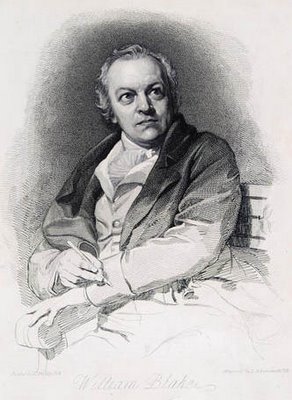
WILLIAM BLAKE (1757-1827)
"I do not contemplate the apparent creation. .. This is an impediment and no action. "Thus William Blake - painter, engraver and poet - explained why his work was filled with religious visions rather than daily life issues. Few people in his time realized that Blake expressed these visions with a talent that approached the genius. He lived near poverty and died unrecognized. Today, however, Blake is acclaimed as one of the great figures in art and English literature, and one of the most inspired and original painters of his time.
Blake was born November 28, 1757, in London. His father ran a hosiery shop. William, the third of five children, went to school only long enough to learn to read and write, and then worked at the store until he was 14 years. When the father found the boy's talent for drawing, put him to work as an apprentice engraver.
At 25 Blake married Catherine Boucher. He taught her to read and write and help with their work. They had no children. They worked together to produce an edition of Blake's poems and drawings, called Songs of Innocence. Blake recorded words and images on copper plates. Catherine made the prints, hand-colored pictures and put together the books. These were sold slowly for a few shillings each. Today a single copy is worth several thousand dollars. Blake's fame as an artist and engraver rests largely part on a set of 21 etchings on copper plates illustrating The Book of Job in the Old Testament. But did many jobs for which other artists and engravers got the fame. Blake was a poor businessman, and preferred to work on issues of their own choosing rather than the editors who assigned him.
was a follower of Emanuel Swedenborg, "who showed him a gentle and mystic interpretation of Christianity, Blake wrote poetry that largely reflects the views Swedenborgians. Songs of Innocence (1789) show life as seen by innocent children. Songs of Experience (1794) include the completion of the pain and terror in the universe for mature. This book contains his famous "Tigre! Tigre! Burning Bright." The Book of Urizen (1800), Milton (1804-2008) and Jerusalem (1804-1820) are works longer and darker. Blake died on August 12, 1827.
0 comments:
Post a Comment